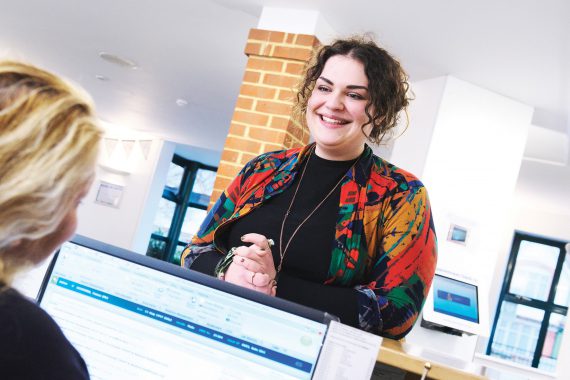
Wakefield GP Dr Clive Harries explains how his practice trained up receptionist staff to signpost patients to more appropriate services, speeding up their access to care and freeing up GP appointments.
The problem
Our practice, like others, has an increasing number of patients with complex and long-term conditions, who need help from a variety of health and social care professionals. These patients still rely on their GP as a first point of contact, but we recognised that sometimes it would be more appropriate for them to access other services directly.
What we did
Our practice decided to adopt a programme established by West Wakefield Health and Wellbeing – a multispecialty community provider (MCP) pilot site – on ‘care navigation’.
This involves training frontline, non-clinical practice staff to provide patients with information about local health and wellbeing services, inside and outside primary care.
Our reception staff were a natural fit for the role, as they have well-established relationships with patients and are the first point of interaction. The staff received training through the Wakefield and district partnership network on services within the care navigation programme.
Care navigation has been a fantastic addition to our practice
When a patient calls or visits, the care navigator asks them why they need to see a GP. Without being intrusive or offering clinical advice, they discuss the patient’s needs and, where appropriate, help them to access other services directly. Importantly, if the patient feels they still require a GP appointment they are supported to arrange one.
An example of where they can refer is our pharmacy in general practice scheme. We have a federation-based pharmacist and technician who undertake medication reviews and advise patients on everyday prescription queries.
Challenges
As with all new service rollouts, Wakefield has faced challenges in implementing the care navigation programme. Patients sometimes feel uneasy providing more information to a non-clinical member of staff, especially in a busy reception area. So we established a care navigation room, where discussions and calls can be held in private if necessary. The room had been an underused office behind the reception desk, so patients and care navigators can relocate there easily if necessary. This has been essential to the programme’s success, as patients feel more comfortable to engage.
Results
Results from our practice, from April to September 2017, saw:
• 1,951 accepted navigations, which would have otherwise resulted in 1,951 GP appointments over the five-month period.
• 100% of patients accepting navigations to sexual health clinics, the nurse practitioner, the stop-smoking service and our local social prescribing service.
Melanie Crew, one of our care navigators, shares a further example of how care navigation has improved patient experience: ‘We have numerous calls each week from patients who have run out of their contraceptive pill and request an appointment with the GP. We are able to quickly re-issue their prescription and signpost them to book an appointment with the nurse practitioner in the future to look at repeat prescriptions. Overall, this process is much quicker and patients are very relieved to know they will receive their medication on the same day.’
Care navigation has been a fantastic addition to our practice. It has allowed us to offer choice to patients, while educating them on the range of specialist services available locally to give them the right care more quickly. In turn, this has led to more GP appointments for patients who require them.
The future
This care navigation approach is now being rolled out nationally. Practices are entitled to funding for staff training, backfill costs and other support, from the £45m allocated in the GP Forward View for upskilling reception and clerical staff.
Interested practices can approach their LMC and CCG for help to secure funding and training in their area; there is also a range of resources available on the Future NHS platform at future.nhs.uk
Care navigation is now offered to all practices across Wakefield and is delivered by South West Yorkshire Partnership NHS Foundation Trust under the Connecting Care programme. It includes around 260 trained care navigators, and we know that more than 8,700 patients accepted navigations between April and September 2017.
Dr Clive Harries is a GP partner at Chapelthorpe Medical Centre in Wakefield, West Yorkshire, and a board member at NHS Wakefield CCG
Pulse October survey
Take our July 2025 survey to potentially win £1.000 worth of tokens












